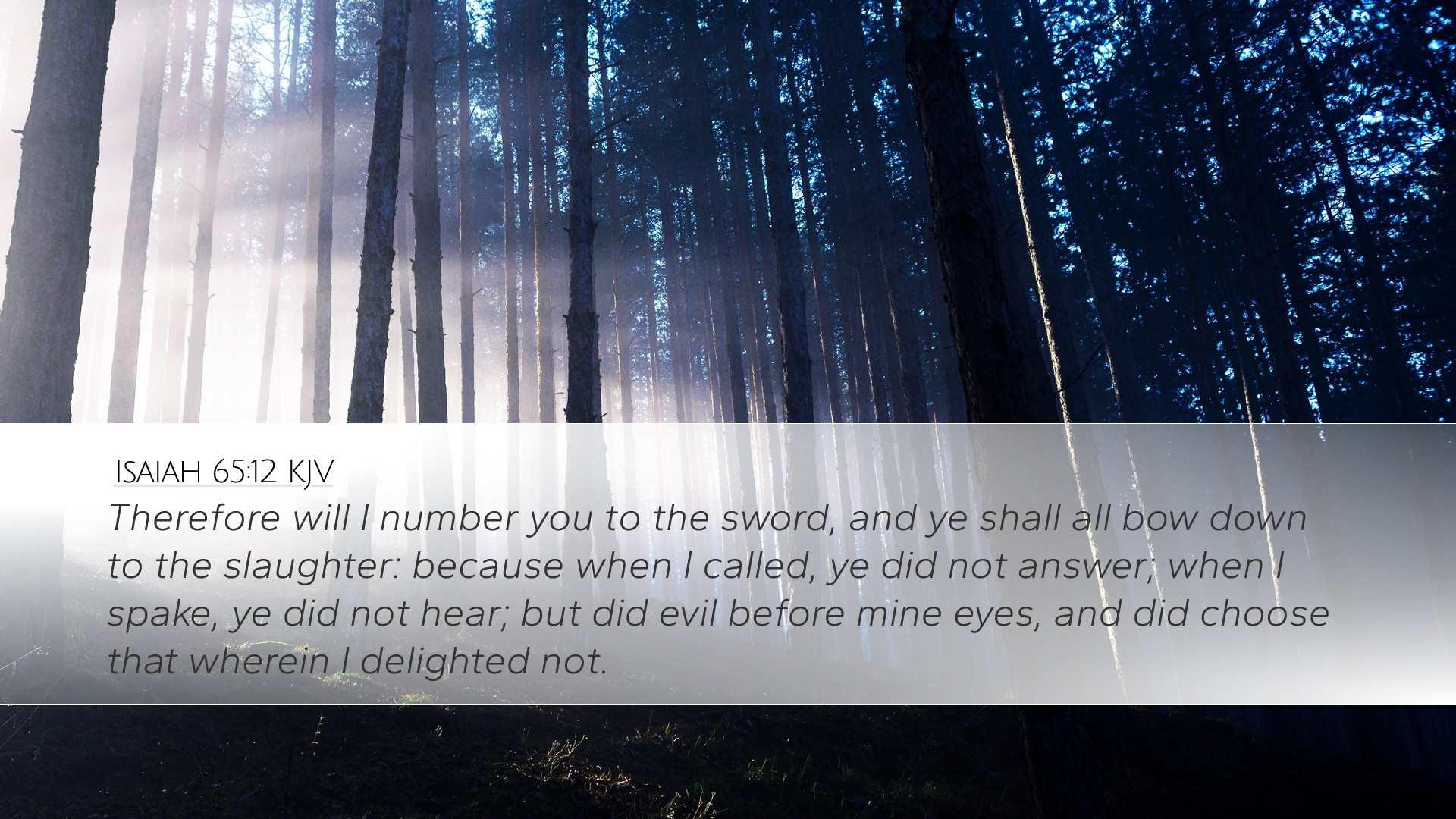Commentary on Isaiah 65:12
Verse: "Therefore will I number you to the sword, and ye shall all bow down to the slaughter: because when I called, ye did not answer; when I spake, ye did not hear; but did evil before mine eyes, and did choose that wherein I delighted not."
Introduction
Isaiah 65:12 stands as a weighty testament to the consequences of disobedience and spiritual neglect in the relationship between God and His people. In this verse, the Lord through the prophet Isaiah issues a solemn warning about judgment that serves both as a historical context for ancient Israel and a timeless lesson for the church today.
Contextual Background
This portion of Isaiah forms part of the closing chapters which transition from prophecies of judgment to promises of hope and restoration. The chapter presents a dichotomy between the faithful and the unfaithful, the righteous and the wicked. Isaiah is addressing a remnant that remains faithful to God amidst widespread apostasy and judgment.
Historical Context
The context of Isaiah’s prophecies relates to the Babylonian exile and the spiritual condition of Israel, replete with idolatry and rebellion against God. Understanding the historical backdrop allows for greater insight into why God expresses such harsh consequences for their actions.
Exegetical Insights
The verse commences with a definitive "Therefore," implying a consequential relationship to the previous verses. The judgment pronounced here is not arbitrary; it follows directly from Israel's choices and actions.
God’s Sovereignty and Justice
Matthew Henry emphasizes that God’s judgments are always just and proportionate to the sins committed. The Lord's statement of numbering the faithless "to the sword" signifies a call for divine justice where rebellion leads to inevitable consequences. This is a declaration of God’s authority over nations and individuals and serves to affirm that disobedience to divine call results in dire repercussions.
Rejection of God’s Call
Albert Barnes notes that God's call is a recurring theme throughout scripture—the divine initiative in seeking a relationship with humanity. The rejection of God's voice illustrates a profound and tragic disregard for His grace. When “I called, ye did not answer,” demonstrates a relational aspect of God’s covenant; He desires response, yet is met with indifference.
Spiritual Indifference and Evil Choices
The latter part of this verse reflects the spiritual condition of Israel's heart. They did "evil before mine eyes," indicating that their actions were not merely mistakes but deliberate choices against God's statutes. Adam Clarke elaborates on the phrase "did choose that wherein I delighted not," suggesting that Israel had forsaken their divine purpose in favor of transgression, choosing practices contrary to God's holiness.
Theological Implications
The verse invites deeper contemplations on the faithfulness of God in addressing rebellion and the nature of divine judgment. It raises critical theological questions regarding human agency, divine sovereignty, and the reality of judgment for those who persist in unrepentant sin.
Judgment as a Theme
A theme present in biblical literature, judgment underscores the seriousness with which God regards sin and the reality of ruin that follows unfaithfulness. This message resonates across the entire biblical narrative, serving as a warning as much as an expression of divine character.
The Call to Response
The call for responsiveness to God is central to understanding our relationship with Him. Matthew Henry reminds us that God’s calls are not merely for the sake of obedience but for the believers’ good, guiding us towards life and away from destruction.
Conclusion
Isaiah 65:12 illustrates the painful realities of ongoing unfaithfulness while simultaneously extending an invitation towards repentance and restoration. For pastors, theologians, and students, this passage is a profound reminder of the significance of listening to God's voice and responding to His call in genuine obedience. In understanding the severe tone of this warning, believers are called both to self-examination and to deeper faithfulness.
Reflection Questions
- What does the rejection of God’s call look like in contemporary contexts?
- How can we cultivate a posture of responsiveness to God's guidance in our spiritual lives?
- What lessons can the church learn today from the judgment pronounced in Isaiah 65:12?


